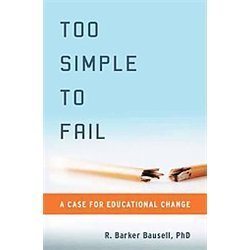 This new book is based on a premise neither
novel nor eye-opening: “Learning comes from time on task, delivered at a level
appropriate to the student.” Years of data (and common sense) say that, too.
What makes this volume interesting is where its author, a professor at the University
of Maryland at Baltimore, takes this insight. Guided by the North Star of
increased productive instructional time, the book criticizes almost every
aspect of the current public education system—from school assemblies to sports
to testing. Each of these “worthless” pursuits detracts from the time that
students spend learning the curriculum. Instead, Barker Bausell urges a number
of provocative changes. Among them: All schools should adopt a “zero-tolerance”
approach to pupil behavior (because any distraction pulls students off task). Teachers
should be evaluated based on the amount of time they spend delivering
curriculum-relevant instruction (divergences are also unwanted distractions). And
testing should be tied directly to curricular objectives (the SATs, for
example, don’t make his A-list). Ultimately, Bausell sees classrooms being
replaced with learning labs, each student learning at a computer able to tailor
a lesson to meet individual needs, much like a private tutor. Unfortunately, as
the book builds upon its original premise, cracks in the idea’s foundation are exposed—many
of which are left unaddressed. How to ensure, for example, that teachers are
following sufficiently rigorous curricula or that rote memorization doesn’t
supersede deeper knowledge. Still and all, the book pushes readers to question
current reforms. And that’s not a bad thing to do from time to time.
This new book is based on a premise neither
novel nor eye-opening: “Learning comes from time on task, delivered at a level
appropriate to the student.” Years of data (and common sense) say that, too.
What makes this volume interesting is where its author, a professor at the University
of Maryland at Baltimore, takes this insight. Guided by the North Star of
increased productive instructional time, the book criticizes almost every
aspect of the current public education system—from school assemblies to sports
to testing. Each of these “worthless” pursuits detracts from the time that
students spend learning the curriculum. Instead, Barker Bausell urges a number
of provocative changes. Among them: All schools should adopt a “zero-tolerance”
approach to pupil behavior (because any distraction pulls students off task). Teachers
should be evaluated based on the amount of time they spend delivering
curriculum-relevant instruction (divergences are also unwanted distractions). And
testing should be tied directly to curricular objectives (the SATs, for
example, don’t make his A-list). Ultimately, Bausell sees classrooms being
replaced with learning labs, each student learning at a computer able to tailor
a lesson to meet individual needs, much like a private tutor. Unfortunately, as
the book builds upon its original premise, cracks in the idea’s foundation are exposed—many
of which are left unaddressed. How to ensure, for example, that teachers are
following sufficiently rigorous curricula or that rote memorization doesn’t
supersede deeper knowledge. Still and all, the book pushes readers to question
current reforms. And that’s not a bad thing to do from time to time.
|
R. Barker Bausell, Too Simple to Fail: The Case for Educational Change, (New York, NY: Oxford University Press, 2011). |